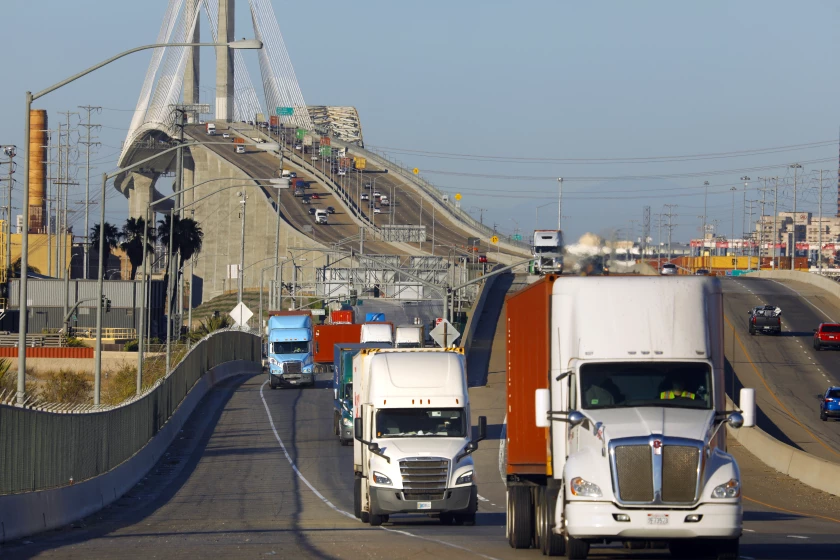
Diesel truck pollution from the busiest port complex in the United States has fouled the air in nearby neighborhoods in Southern California for decades. So when port officials asked for feedback on cleaning up that pollution, hundreds of people weighed in.
Los Angeles and Long Beach officials hoped residents would help them decide whether to require zero-pollution electric trucks or instead promote vehicles powered by natural gas, a fossil fuel.
What officials didn’t know was that some of the locals who urged support for natural gas trucks were being paid by a firm hired by the natural gas industry.
A joint investigation by The Times and the news outlet Floodlight in partnership with the Guardian found that in 2017 at least 20 locals were organized by Method Campaign Services to push for “near-zero-emission” trucks at the ports. Their comments at public meetings and press conferences bolstered successful industry lobbying for trucks that run on natural gas, which is less polluting than diesel but still contributes to lung-damaging emissions and climate change.
San Pedro resident Sholeh Bousheri, who was hired by Method to speak at public hearings, was one of several paid campaigners who said they only learned later that their work was part of a natural gas industry effort.
Bousheri said Method led her to believe she’d be “standing up for sustainability” as part of an environmental campaign. She said she pieced together the gas industry’s role when she was paid to hand out pamphlets featuring the logo of Southern California Gas Co., the nation’s largest gas utility.
“It didn’t make me feel comfortable. I took a whole ethical step back,” she said. “I was like, ‘Wait, what’s going on?’ Is this something I want to support with you? Is it moral?”
Method was being paid at the time by Clean Energy Fuels Corp., which owns natural gas fueling stations and like Southern California Gas has resisted the state’s transition away from fossil fuel infrastructure. Clean Energy paid at least $10,000 to Method in 2017, according to financial disclosures.
The total amount spent is unclear, because California only requires public officials to list sources of income of $10,000 or more, not how much money they received. The financial disclosures were filed by Method founder Brian VanRiper’s spouse, Samantha Millman, a member of L.A.’s City Planning Commission.
VanRiper declined to answer detailed questions about his firm’s work, saying in an email that it would be “inappropriate for me to discuss any client’s strategy” and directing questions to Clean Energy Fuels.
Greg Roche, Clean Energy’s vice president for sustainability, acknowledged in an interview that Method did “community outreach” as part of the gas industry campaign but said he didn’t know anything about the firm paying local residents. Clean Energy declined to respond to emailed follow-up questions about whether it directed Method’s activities.
The Times and Floodlight didn’t find evidence that SoCalGas paid Method or knew about its hiring of local residents. The gas utility didn’t answer questions about whether it had any involvement in Method’s work.
The gas industry ultimately won the debate at the ports. Citing community support as a factor, officials approved a plan that opened the door to natural gas trucks.
As economics and public opinion shift against planet-warming fuels, America’s natural gas industry has found itself on the defensive. Companies and trade groups have persuaded several states to pass laws blocking local governments from banning gas in new housing, and argued that gas should be included in the “clean electricity standard” proposed by President Biden.
Sometimes the industry turns to more sympathetic messengers to make its arguments.
The American Gas Assn., for instance, has paid Instagram influencers to post about how much they love cooking on gas stoves. In New Orleans, a public relations firm working on behalf of Entergy Corp. paid actors to show up at a meeting and urge officials to approve a gas-fired power plant. Entergy claimed it didn’t know about the arrangement.
Natural gas companies say they’re trying to preserve consumer choice and promote access to an affordable and widely used fuel. Gas is the largest power source in California and nationwide, and it’s often burned for electricity when solar and wind farms aren’t generating. More U.S. homes are heated by natural gas than any other fuel.
But gas is also a major driver of the climate crisis, which has brought a growing death toll and economic devastation from worsening wildfires, droughts, floods and heat waves.
Critics say the gas industry works to thwart climate action with “astroturf” campaigns meant to create the appearance of grassroots support. Robert Brulle, a visiting professor at Brown University who researches climate denial and misinformation, said the campaign at the ports is an example of why astroturfing can be so effective.
“It’s turning economic power into political power in a way that systematically distorts public dialogue,” he said.
Going to bat for the gas industry
State data show that the largelyLatino, low-income neighborhoods surrounding the ports — including San Pedro, Wilmington and parts of Long Beach — have some of the highest “pollution burdens” in California, a measure that includes diesel particulates and ozone in the air. Much of that pollution comes from trucks that move cargo north along the 710 Freeway. The neighborhoods also have some of the state’s highest asthma rates.
The 2017 battle over limiting air pollution in these areas became a significant opportunity for the gas industry to spur investment in its products.
The California Natural Gas Vehicle Coalition, whose backers include Clean Energy Fuels and SoCalGas, said its plan would cut asthma-inducing pollution and climate emissions much faster than a separate proposal being considered by port officials. The benefits would be even greater, supporters said, if trucks could be fueled with renewable gas, which is sourced from non-fossil origins such as dairies and landfills but still generates emissions.
On the other side, climate and environmental justice activists pushed for electric trucks that would take advantage of solar and wind energy on the power grid. Several local groups that advocate for low-income communities and people of color argued that trucks fueled by natural gas would still create too much pollution.
Despite that opposition, several dozen people identifying as nearby residents urged support for near-zero trucks while echoing gas industry talking points, according to an analysis conducted by the Climate Investigations Center, a watchdog group.
The Times and Floodlight couldn’t confirm that all of those residents were part of an organized campaign. But one of them shared an email from a Method employee that included an attachment listing 19 people the company had scheduled to attend harbor commission meetings.
Nearly all of them ultimately spoke, as did Bousheri, almost uniformly identifying themselves as local residents and taking positions aligned with the gas industry’s ACT Now Plan, which stood for Advanced Clean Trucks.
Bousheri was one of four port-area residents interviewed for this article who said they were paid by Method to attend and speak at public meetings. A recent college graduate, Bousheri found the job posting on Indeed.com and said she earned $20 an hour.
Three other local residents who spoke at meetings also saidthey were paid $20 an hour by Method. Two said they found the job advertised online as an “environmental fellowship.”
Another paid campaigner, Danielle Marquez, wasn’t hired by Method but said the ACT Now campaign gave her $20 Visa gift cards when she attended events and spoke at public meetings. She called the gift cards a “perk” that she put toward gasoline money.
A Latina single mother of four who used to live in San Pedro, Marquez said she attended a public speaking training organized by the industry campaign where she was coached to make her comments “personal.” She brought her children with her to hearings.
Marquez didn’t know until she was contacted for this article that she had worked on behalf of the natural gas industry. But she wasn’t surprised. She said fossil fuel companies “are running rampant and exploiting people [and] our communities and polluting the environment.”
“Their voices are now louder than the people who live there, and it’s just truly tragic,” Marquez said. “There is no amount of money they can give us that will fix it.”
Ana Leon, who was a college student in Long Beach at the time, said she wasn’t surprised to learn years later that her work for Method was part of a natural gas industry campaign.
“I don’t feel angry necessarily. But I do feel disappointed,” Leon said. “At the same time, in hindsight … I know this sounds bad, but it’s like, at least I got paid.”
A threat to the bottom line
Heavy-duty trucks are one of several battlegrounds between climate advocates pushing for an all-electric future and natural gascompanies who insist they have a role to play in reducing emissions. The more money that’s funneled into electric technologies, the smaller the market for companies such as Clean Energy Fuels looking to cash in on gas.
“They need to hook as many people into natural gas trucks as possible in the next couple of years, because I think they really do see electrification as a threat to their ability to sell product,” said Adrian Martinez, an attorney with the nonprofit law firm Earthjustice who has worked with community groups pushing for electric trucks at the ports.
Clean Energy has described environmental rules designed to limit vehicle emissions as a “risk factor” for its business, saying in a recent financial report that the adoption of natural gas in heavy-duty trucking has been slower than anticipated.
Clean Energy, alongside SoCalGas, is one of two leading members of the California Natural Gas Vehicle Coalition, which is suing California’s Air Resources Board over a regulation supporting zero-emission trucks.
Like many natural gas firms facing demands for climate action, the two companies have argued their productscan reduce air pollution and slow global warming by displacing dirtier fuels such as coal and diesel. They’ve both made investments in non-fossil gas, with Clean Energy saying 74% of the gas sold at its fueling stations nationwide is now renewable, including all the fuel it supplies at the L.A. and Long Beach ports.
Roche, from Clean Energy, said people who live near the ports want cleaner air as soon as possible and shouldn’t have to wait for battery-powered trucks to get cheap enough for mass adoption. If port officials were to demand electric vehicles exclusively, he said, they would be “kicking the can down the road to 2035.”
“We’re very affordable and competitive compared to the status quo and can be deployed today,” Roche said.
Climate and environmental justice activists counter that there are several heavy-duty electric trucks available now, and more on the way. Even in 2017, they say, it was clear those zero-emissions options would be available soon. They’re also skeptical of renewable gas, which they see as a false solution that fails to eliminate tailpipe pollution and can perpetuate environmental problems elsewhere.
Many experts, meanwhile, have found that growing reliance on fossil gas threatens to bring on the worst consequences of climate chaos.
The ports defended their process.
Heather Tomley, managing director of planning and environmental affairs for the Port of Long Beach, emphasized there was extensive public engagement outside the handful of large hearings.
“Our board felt that [near-zero trucks] was the right choice in the near term,” Tomley said. “It was not a choice about promoting one particular technology. It was a choice about what can we do to make sure they don’t just upgrade to a slightly lower-emission diesel truck.”
Chris Cannon, director of environmental management for the Port of Los Angeles, said officials were supposed to listen to everybody and would not “speculate about what’s behind those comments.” The Port of L.A. did ask commenters to indicate if they were being paid, and if so by whom, but compliance was voluntary.
Nicole Rice, president of the California Natural Gas Vehicle Coalition, said in an email that there’s “nothing unusual about paid advocates attending governmental meetings,” although she didn’t know the details of what happened in 2017 because she only recently joined the organization. The Times and Floodlight didn’t find evidence that the coalition paid Method or directed its work.
So far, the ports haven’t seen much of a transition to natural gas-fueled trucks, despite the Clean Air Action Plan they adopted in 2017. Of the more than 19,000 trucks registered to haul cargo from the ports, just 164 are modern natural gas trucks and 25 are battery electric.
Still, Clean Energy Fuels is thriving. The Newport Beach-based company has seen its stock price triple since the November election. It recently struck deals to provide renewable gas to Amazon and more than a dozen other buyers, including a trucking company at the ports of L.A. and Long Beach.
In Southern California, the company’s fortunes may depend in part on what port officials do next. A recent financial disclosure from Millman, the city planning commissioner married to the head of Method, shows her spouse’s firm received additional payments from Clean Energy in 2020. Clean Energy declined to say whether it hired Method for another campaign at the ports.


